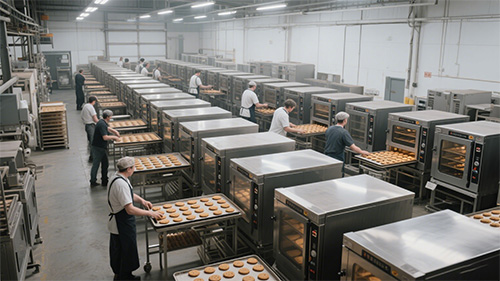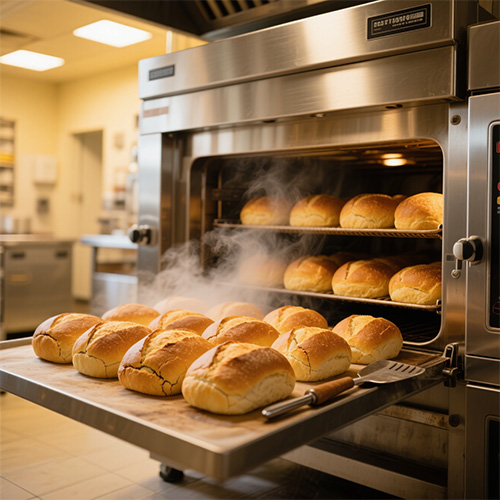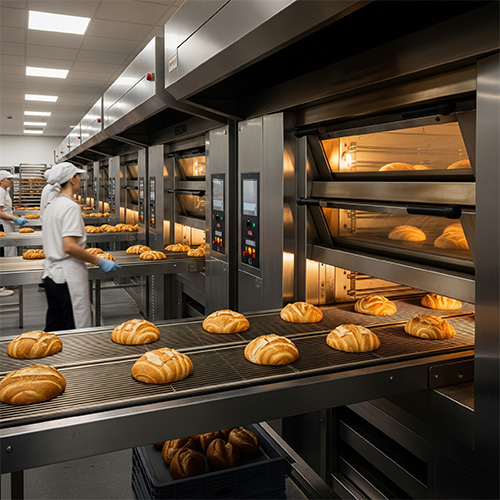



Ever wondered how top bakeries churn out perfectly baked breads and pastries day after day? The secret lies in professional bakery equipment, the backbone of efficient, high-quality production. As a leading innovator in intelligent bakery production lines, our engineering and R&D teams specialize in crafting cutting-edge food processing equipment and tailored solutions for bakeries worldwide.
Whether you’re running a chain of retail bakeries or a large-scale food manufacturing plant, professional bakery equipment streamlines processes like dough mixing, fermentation, shaping, and baking, ensuring consistent quality and boosting your bottom line.
In this guide, we’ll walk you through everything you need to know about professional bakery equipment—what it is, how it works, and why it’s a game-changer for your business. Let’s dive in!
Professional bakery equipment refers to specialized machinery designed for industrial bread production, retail bakery chains, and large food processing facilities. These systems automate key stages of baking—mixing, fermenting, shaping, and baking—while maintaining precision and consistency. Equipped with advanced temperature and humidity controls, this equipment ensures every loaf or pastry meets high-quality standards, per ISO 6330 guidelines for food processing performance.
At its core, bakery equipment integrates multiple functions into a seamless production line. Dough mixers knead ingredients to the perfect consistency, proofers control fermentation with precise humidity and temperature settings, dividers and moulders shape dough accurately, and ovens deliver uniform baking results. A 2024 study by the International Baking Industry Exposition (IBIE) found that automated bakery systems can increase output by up to 40% while reducing labor costs by 25%. Whether you’re producing artisan sourdough or high-volume sandwich loaves, professional bakery equipment is your key to scalability and quality.
Investing in bakery equipment means investing in efficiency, consistency, and competitiveness. These systems minimize human error, reduce waste, and ensure every batch meets customer expectations. For chain bakeries or food manufacturers, this translates to higher throughput, lower operational costs, and a stronger market presence.
Professional bakery equipment encompasses a range of machines, each tailored to a specific stage of the baking process. Here’s a breakdown of the essential components:
Spiral or planetary mixers are the heart of any bakery, ensuring uniform dough consistency. Advanced models feature programmable settings to handle various dough types, from high-hydration artisan breads to dense bagel doughs, as outlined in ASTM D4265 standards.
Proofers create the ideal environment for dough to rise, with precise control over temperature (typically 75–85°F) and humidity (80–90%). This ensures consistent fermentation, critical for flavor and texture, especially in sourdough or ciabatta production.
Dividers portion dough into equal weights, while moulders shape it into loaves, rolls, or baguettes. Automated systems reduce manual labor and ensure uniformity, boosting efficiency in high-volume settings.
From deck ovens for artisan crusts to tunnel ovens for continuous production, ovens in professional bakery equipment deliver consistent heat distribution. Rack ovens, for example, can bake hundreds of loaves simultaneously, ideal for large-scale operations.
Post-baking, cooling systems prevent sogginess by rapidly reducing bread temperature, while automated packaging lines ensure hygiene and extend shelf life, per FDA food safety guidelines.
Choosing the right professional bakery equipment depends on your production needs. You can refer to the parameters of our bakery equipment in order to make your choice:
| Parameter | Specification |
|---|---|
| Output | 1000-15000 pcs/h |
| Final Product Weight | 15-500 g/pcs |
| Size | 3800 × 700 × 1600 mm |
Selecting the best equipment depends on:
Why should you upgrade to bakery equipment? Here are the top advantages:
By integrating professional bakery equipment, you’re not just baking—you’re building a competitive, efficient operation.
Professional bakery equipment is used across various settings, from retail chains to industrial plants. Here are some key applications:
Retail bakery chains rely on bakery equipment to produce consistent products across multiple locations. Automated mixers and rack ovens ensure uniformity in sandwich loaves and pastries, boosting brand reliability.
Large-scale producers use tunnel ovens and continuous proofing systems for high-volume production of toast bread, buns, and rolls. These systems handle capacities up to 9,000 kg/hour, per industry benchmarks.
Smaller bakeries crafting specialty breads like sourdough or ciabatta use deck ovens and spiral mixers for precise control and authentic textures, as noted in a 2024 Baking Industry Journal.
Planetary mixers and depositors in professional bakery equipment are ideal for producing cakes, cookies, and delicate pastries with consistent quality.
Advanced equipment with customizable settings supports niche products like gluten-free breads, ensuring proper dough handling and contamination-free production.
To maximize the lifespan and performance of your professional bakery equipment, follow these tips:
Proper care can extend equipment lifespan by years, saving you costly repairs and replacements.
From kneading dough to baking perfect loaves, professional bakery equipment transforms your operations, delivering efficiency, consistency, and quality that set you apart in a competitive market. As a trusted manufacturer with a dedicated engineering and R&D center, we’re passionate about providing intelligent bakery production lines tailored to your needs—whether you’re a chain bakery or a large food manufacturer.
What is professional bakery equipment best suited for?
Professional bakery equipment is ideal for chain bakeries, industrial food manufacturers, and artisan bakeries needing automated, high-quality production. It handles mixing, proofing, shaping, and baking for consistent results across large or specialty batches.
How does professional bakery equipment improve efficiency?
Automation in bakery equipment cuts labor time by up to 30% and reduces waste, per a 2023 Food Processing Technology study. Systems like tunnel ovens and automated proofers streamline high-volume production
Can professional bakery equipment handle specialty products like gluten-free bread?
Yes, advanced models offer customizable settings to process high-hydration or gluten-free doughs, ensuring contamination-free production and consistent quality for specialty products.
What should I consider when choosing professional bakery equipment?
Focus on your production volume, product type, and space constraints. Modular systems are great for scalability, while deck ovens suit artisan breads. Consult with experts to match equipment to your needs.

